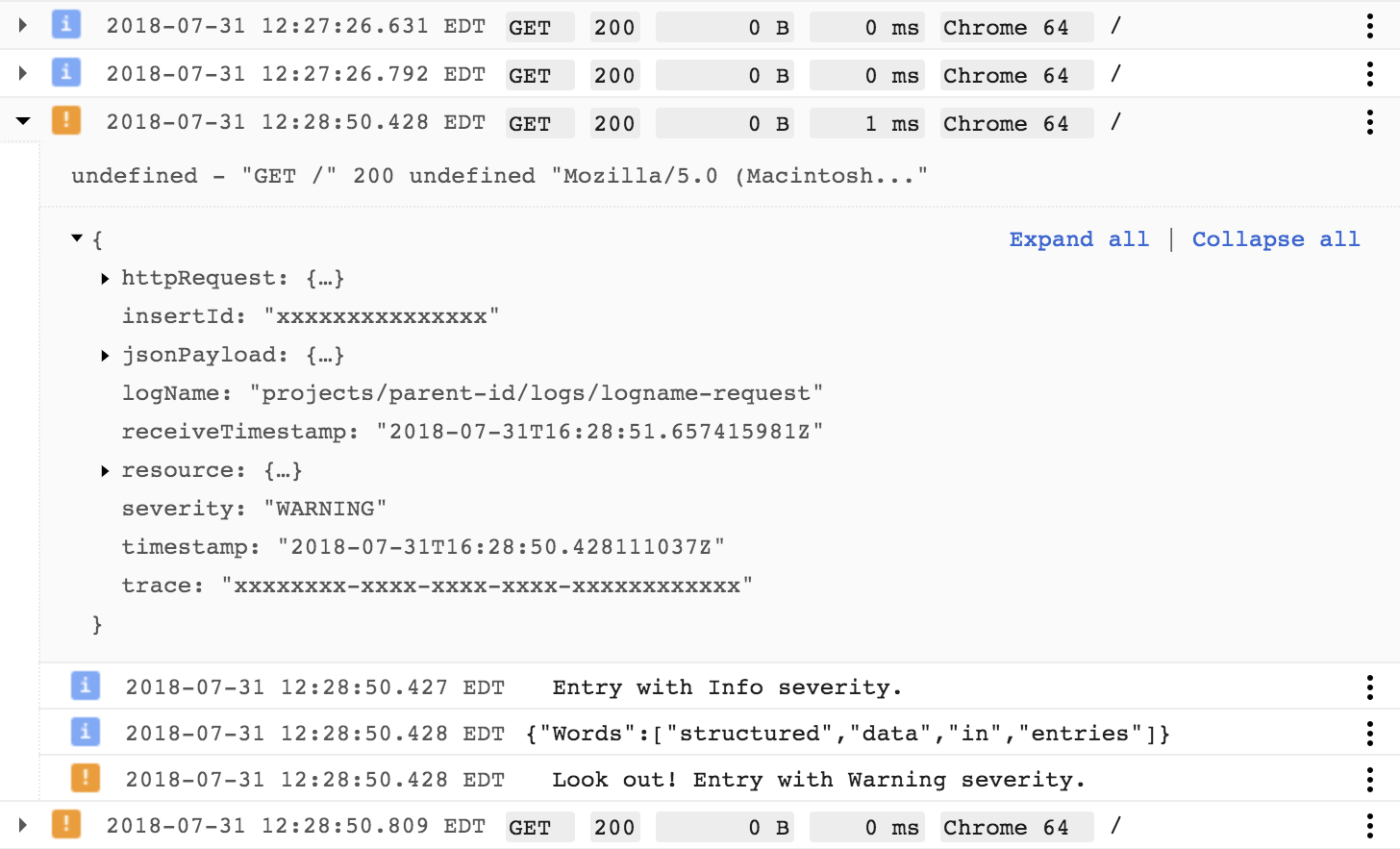 Documentation
¶
Documentation
¶
Overview ¶
Package grouplogger wraps a Stackdriver logging client to facilitate writing groups of log entries, similar to the default behavior in Google App Engine Standard.
var r *http.Request
ctx := context.Background()
cli, err := NewClient(ctx, "logging-parent")
if err != nil {
// Handle "failed to generate Stackdriver client."
}
logger := cli.Logger(r, "app_identifier", logging.CommonLabels(WithHostname(nil)))
logger.Info("Info log entry body.")
logger.Error("Error log entry body.")
logger.Close()
Index ¶
- func WithHostname(labels map[string]string) map[string]string
- type Client
- type GroupLogger
- func (gl *GroupLogger) Alert(payload interface{})
- func (gl *GroupLogger) Close()
- func (gl *GroupLogger) CloseWith(stats *logging.HTTPRequest)
- func (gl *GroupLogger) Critical(payload interface{})
- func (gl *GroupLogger) Debug(payload interface{})
- func (gl *GroupLogger) Default(payload interface{})
- func (gl *GroupLogger) Emergency(payload interface{})
- func (gl *GroupLogger) Error(payload interface{})
- func (gl *GroupLogger) Info(payload interface{})
- func (gl *GroupLogger) Log(e logging.Entry)
- func (gl *GroupLogger) LogInnerEntry(entry logging.Entry)
- func (gl *GroupLogger) LogOuterEntry(entry logging.Entry)
- func (gl *GroupLogger) Notice(payload interface{})
- func (gl *GroupLogger) Warning(payload interface{})
Constants ¶
This section is empty.
Variables ¶
This section is empty.
Functions ¶
Types ¶
type Client ¶
type Client struct {
// contains filtered or unexported fields
}
Client adds different Logger generation to Stackdriver's logging.Client.
It can be reused across multiple requests to generate a Logger for each one without repeating auth.
func NewClient ¶
NewClient generates a new Client associated with the provided parent.
Options are documented here: https://godoc.org/google.golang.org/api/option#ClientOption
func (*Client) Logger ¶
func (client *Client) Logger(r *http.Request, name string, opts ...logging.LoggerOption) *GroupLogger
Logger constructs and returns a new GroupLogger object for a new group of log entries corresponding to a request R.
Logger options (labels, resources, etc.) are documented here: https://godoc.org/cloud.google.com/go/logging#LoggerOption
func (*Client) Ping ¶
Ping reports whether the client's connection to the logging service and the authentication configuration are valid. To accomplish this, Ping writes a log entry "ping" to a log named "ping".
func (*Client) SetOnError ¶
SetOnError sets the function that is called when an error occurs in a call to Log. This function should be called only once, before any method of Client is called.
Detailed OnError behavior is documented here: https://godoc.org/cloud.google.com/go/logging#Client
type GroupLogger ¶
type GroupLogger struct {
Req *http.Request
GroupID string
OuterLogger *logging.Logger
InnerLogger *logging.Logger
InnerEntries []logging.Entry
}
GroupLogger wraps two Stackdriver Logger clients. The OuterLogger is used to write the entries by which other entries are grouped: usually, these are requests. The InnerLogger is used to write the grouped (enclosed) entries.
These groups are associated in the Stackdriver logging console by their GroupID.
For the inner entries to appear grouped, either `LogOuterEntry` or `CloseWith` must be called.
func (*GroupLogger) Alert ¶
func (gl *GroupLogger) Alert(payload interface{})
Alert logs the payload as an inner entry with severity logging.Alert. Payload must be JSON-marshalable.
func (*GroupLogger) Close ¶
func (gl *GroupLogger) Close()
Close calls CloseWith without specifying statistics. It does not close the client that generated the GroupLogger.
Latency, status, response size, etc. are set to 0 or nil.
func (*GroupLogger) CloseWith ¶
func (gl *GroupLogger) CloseWith(stats *logging.HTTPRequest)
CloseWith decorates the group's base request with the GroupID and with the maximum severity of the inner entries logged so far. It does not close the client that generated the GroupLogger.
If LogOuterEntry is not called, nothing from this group will appear in the outer log.
func (*GroupLogger) Critical ¶
func (gl *GroupLogger) Critical(payload interface{})
Critical logs the payload as an inner entry with severity logging.Critical. Payload must be JSON-marshalable.
func (*GroupLogger) Debug ¶
func (gl *GroupLogger) Debug(payload interface{})
Debug logs the payload as an inner entry with severity logging.Debug. Payload must be JSON-marshalable.
func (*GroupLogger) Default ¶
func (gl *GroupLogger) Default(payload interface{})
Default logs the payload as an inner entry with severity logging.Default. Payload must be JSON-marshalable.
func (*GroupLogger) Emergency ¶
func (gl *GroupLogger) Emergency(payload interface{})
Emergency logs the payload as an inner entry with severity logging.Emergency. Payload must be JSON-marshalable.
func (*GroupLogger) Error ¶
func (gl *GroupLogger) Error(payload interface{})
Error logs the payload as an inner entry with severity logging.Error. Payload must be JSON-marshalable.
func (*GroupLogger) Info ¶
func (gl *GroupLogger) Info(payload interface{})
Info logs the payload as an inner entry with severity logging.Info. Payload must be JSON-marshalable.
func (*GroupLogger) Log ¶
func (gl *GroupLogger) Log(e logging.Entry)
Log logs the payload as an inner entry with severity logging.Default. Payload must be JSON-marshalable.
func (*GroupLogger) LogInnerEntry ¶
func (gl *GroupLogger) LogInnerEntry(entry logging.Entry)
LogInnerEntry pushes an inner log entry for the group, decorated with the GroupID.
func (*GroupLogger) LogOuterEntry ¶
func (gl *GroupLogger) LogOuterEntry(entry logging.Entry)
LogOuterEntry pushes the top-level log entry for the group, decorated with the GroupID.
For the group to be grouped in the GCP logging console, ENTRY must have entry.HTTPRequest set.
func (*GroupLogger) Notice ¶
func (gl *GroupLogger) Notice(payload interface{})
Notice logs the payload as an inner entry with severity logging.Notice. Payload must be JSON-marshalable.
func (*GroupLogger) Warning ¶
func (gl *GroupLogger) Warning(payload interface{})
Warning logs the payload as an inner entry with severity logging.Warning. Payload must be JSON-marshalable.
